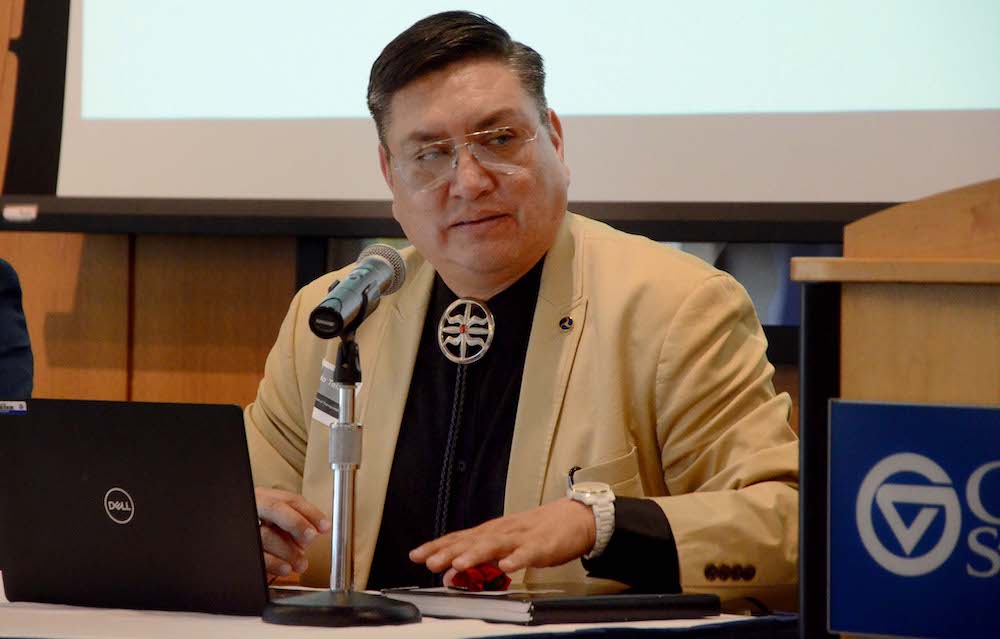
- Details
- By Brian Edwards
WASHINGTON—Arlando Teller, a citizen of the Navajo Nation, was sworn in Friday as the U.S. Department of Transportation’s first-ever assistant secretary for Tribal Affairs.
A spokesperson for the Department of Transportation confirmed Teller’s appointment and said there will be a ceremonial swearing in at a later date, to be announced.
The new position was created as part of the enactment of the Bipartisan Infrastructure Law (BIL) that provides $550 billion for new federal investment in roads, bridges, mass transit, water infrastructure and broadband.
The BIL established an Office of Tribal Affairs to stand independently within the Office of the Secretary. It also changed Tribal Affairs leadership in the DOT by elevating the position of Deputy Assistant Secretary for Tribal Affairs to the position of Assistant Secretary of Indian Affairs.
Teller, who joined the DOT in February 2021 as deputy assistant secretary for tribal affairs, will fill the newly created post. He brings with him a lengthy resume in aviation/aerospace as well as transportation planning for both the state of California and the Navajo Nation.
“I am sincerely humbled and honored to represent my family, community, tribe and all of Indian Country as their Assistant Secretary for Tribal Affairs," Teller told Tribal Business News in a text message. "This opportunity wouldn’t have happened without the staunch advocacy and commitment from Tribal Transportation Leaders. A’hee’hee níí tsá’góó!”
Teller is the first Native American graduate from Embry-Riddle Aeronautical University and also served as a member of the Arizona House of Representatives. He was elected in 2018 and resigned from his position in 2021 to accept the position as deputy assistant secretary at the Transportation Department.
Teller is an enrolled member of the Navajo Nation and a graduate of Chinle High School.
This story was originally published in Tribal Business News.
More Stories Like This
Native News Weekly (August 25, 2024): D.C. BriefsUS Presidents in Their Own Words Concerning American Indians
Indigenous Actor Elaine Miles Reports Detention by Alleged ICE Agents
Happy Thanksgiving from Native News Online
Coming Up on Native Bidaské: Behind the Animation: Joey Clift Talks “Pow” and Native Storytelling
Help us tell the stories that could save Native languages and food traditions
At a critical moment for Indian Country, Native News Online is embarking on our most ambitious reporting project yet: "Cultivating Culture," a three-year investigation into two forces shaping Native community survival—food sovereignty and language revitalization.
The devastating impact of COVID-19 accelerated the loss of Native elders and with them, irreplaceable cultural knowledge. Yet across tribal communities, innovative leaders are fighting back, reclaiming traditional food systems and breathing new life into Native languages. These aren't just cultural preservation efforts—they're powerful pathways to community health, healing, and resilience.
Our dedicated reporting team will spend three years documenting these stories through on-the-ground reporting in 18 tribal communities, producing over 200 in-depth stories, 18 podcast episodes, and multimedia content that amplifies Indigenous voices. We'll show policymakers, funders, and allies how cultural restoration directly impacts physical and mental wellness while celebrating successful models of sovereignty and self-determination.
This isn't corporate media parachuting into Indian Country for a quick story. This is sustained, relationship-based journalism by Native reporters who understand these communities. It's "Warrior Journalism"—fearless reporting that serves the 5.5 million readers who depend on us for news that mainstream media often ignores.
We need your help right now. While we've secured partial funding, we're still $450,000 short of our three-year budget. Our immediate goal is $25,000 this month to keep this critical work moving forward—funding reporter salaries, travel to remote communities, photography, and the deep reporting these stories deserve.
Every dollar directly supports Indigenous journalists telling Indigenous stories. Whether it's $5 or $50, your contribution ensures these vital narratives of resilience, innovation, and hope don't disappear into silence.
 The stakes couldn't be higher. Native languages are being lost at an alarming rate. Food insecurity plagues many tribal communities. But solutions are emerging, and these stories need to be told.
The stakes couldn't be higher. Native languages are being lost at an alarming rate. Food insecurity plagues many tribal communities. But solutions are emerging, and these stories need to be told.
Support independent Native journalism. Fund the stories that matter.
Levi Rickert (Potawatomi), Editor & Publisher

